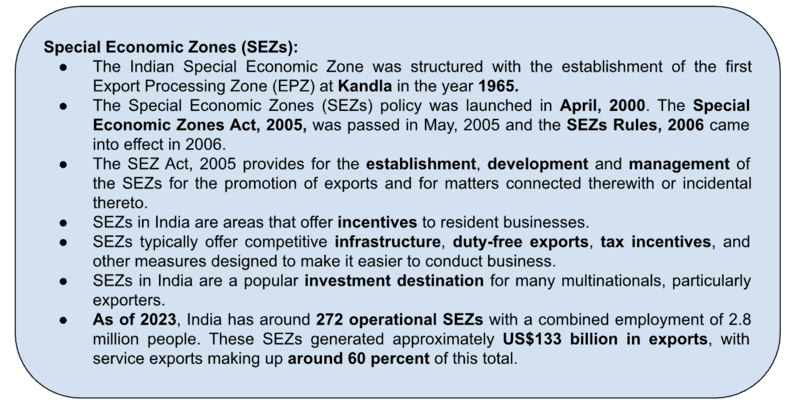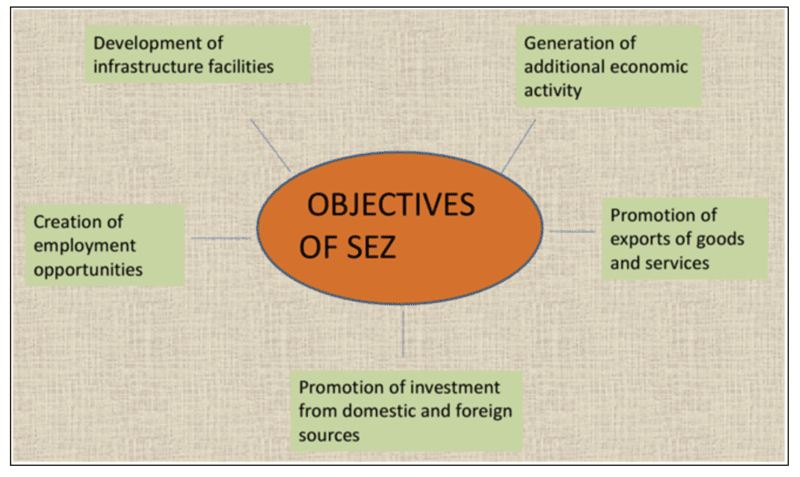GS Paper III
News Excerpt:
The Government has amended the Special Economic Zones (SEZ) Rules to permit the demarcation of a portion of the built-up area in an IT/ITES (Information Technology/Information Technology Enabled Services) SEZ as a non-processing area.
About the Amendments:
- The Ministry of Commerce and Industry in December, 2023 amended the Special Economic Zones Rules, 2006.
- It now permits the demarcation of a portion of the built-up area within an SEZ unit on a floor-by-floor basis as a non-processing or non-SEZ area.
- A non-processing area may be used for setting up and operation of businesses engaged in IT/ITES, and at such terms and conditions as may be specified by the Board of Approval.
- A Non-processing area shall consist of a complete floor and part of a floor shall not be demarcated as a non-processing area.
- Demarcation of a non-processing area shall not be allowed if it results in decreasing the processing area to less than fifty percent of the total area or less than the area specified.
- However, repayment of tax concessions associated with the non-processing area will be required.
- The repayment of tax benefits will be determined by calculating the benefits provided for the processing area of the SEZ.
Significance of the Amendment:
- Industry Demand for Amendment: The industry had long demanded this amendment, especially after the phasing out of tax benefits led to occupiers being less inclined to locate in SEZs due to increased compliance requirements.
- Addressing Compliance Concerns: The amendment addresses these concerns and is expected to make SEZs more attractive for businesses.
- Reduction of SEZ Vacancy: The move is expected to reduce vacancies in SEZs, making them more appealing to businesses.
- Positive Impact on REITs: It is likely to have a positive impact on Real Estate Investment Trusts (REITs) with significant SEZ space in their portfolios, as the demand for such spaces may increase.
- Harmonious co-existence: It will pave the way for a harmonious co-existence of SEZ and non-SEZ entities within a unified campus, enhancing the ease of doing business for corporations, developers and investors.
- Boost economy and employment: This progressive reform is a significant step in the ongoing efforts to increase occupancy within IT SEZ Parks, boosting economic activity and creating more jobs.
- E.g.- Currently, our SEZ occupancy levels are around 80%, and this amendment will further elevate the attractiveness of our 20 million sa ft premium grade-A SEZ office spaces.


About Processing and Non-Processing Area:
Processing area:
- The processing area in a SEZ is the designated space where units are established for the primary purpose of manufacturing goods or rendering services that contribute directly to the economic activity and objectives of the SEZ.
Non-processing area:
- The non-processing area in an SEZ refers to the space where supporting infrastructure is developed.
- Activities in the non-processing area are not directly involved in the core business operations of manufacturing or service provision.
Conclusion:
The amendment to SEZ Rules represents a progressive reform aimed at enhancing the operational flexibility of IT and IT-enabled services SEZs, fostering economic growth, and attracting diverse businesses to these specialized zones. The impact is not only on the spatial dynamics within SEZs but also on the overall economic landscape, with potential benefits for developers, businesses, and job seekers.
Mains PYQ
Q. There is a clear acknowledement that Speecial Economic Zones (SEZs) are a tool of industrial development, manufacturing and exports. Recognizing this potential, the whole instrumentality of SEZs requires augmentation. Discuss the issues plaguing the success of SEZs with respect to taxation, governing laws and administration. (UPSC 2015)


